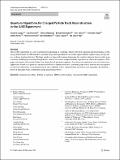Quantum Algorithms for Charged Particle Track Reconstruction in the LUXE Experiment
Author(s)
Crippa, Arianna; Funcke, Lena; Hartung, Tobias; Heinemann, Beate; Jansen, Karl; Kropf, Annabel; Kühn, Stefan; Meloni, Federico; Spataro, David; Tüysüz, Cenk; Yap, Yee C.; ... Show more Show less
Download41781_2023_Article_109.pdf (1.602Mb)
Publisher with Creative Commons License
Publisher with Creative Commons License
Creative Commons Attribution
Terms of use
Metadata
Show full item recordAbstract
The LUXE experiment is a new experiment in planning in Hamburg, which will study quantum electrodynamics at the strong-field frontier. LUXE intends to measure the positron production rate in this unprecedented regime using, among others, a silicon tracking detector. The large number of expected positrons traversing the sensitive detector layers results in an extremely challenging combinatorial problem, which can become computationally expensive for classical computers. This paper investigates the potential future use of gate-based quantum computers for pattern recognition in track reconstruction. Approaches based on a quadratic unconstrained binary optimisation and a quantum graph neural network are investigated in classical simulations of quantum devices and compared with a classical track reconstruction algorithm. In addition, a proof-of-principle study is performed using quantum hardware.
Date issued
2023-12-18Department
Massachusetts Institute of Technology. Center for Theoretical PhysicsPublisher
Springer International Publishing
Citation
Computing and Software for Big Science. 2023 Dec 18;7(1):14
Version: Final published version